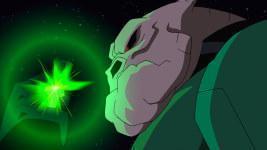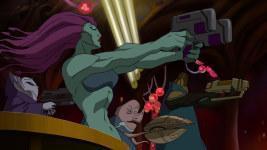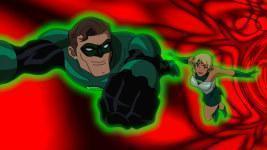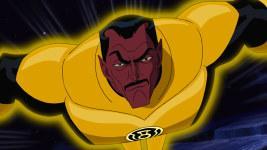Robert Kral Interview
(Conducted by The World's Finest)
 We've interviewed you before, but
just incase some readers aren't familiar with your work, care to provide a few
details about yourself and give us a quick rundown on your work? We've interviewed you before, but
just incase some readers aren't familiar with your work, care to provide a few
details about yourself and give us a quick rundown on your work?
I'm a music composer. The longest running project I've written the music
score for was for the TV show "Angel", the "Buffy the Vampire Slayer" spin-off
series. Other shows include "Miracles", "The Inside", "The Lost Room" and "The
Dresden Files" and earlier this year "The Haunting in Connecticut" which was
released in theaters. Warner Bros Animation work includes the music score for
the series "Duck Dodgers" (which still remains as the most fun I've ever had on
a job!), Superman Doomsday, Batman Gotham Knight and most recently, Green
Lantern: First Flight.
Alright, with the introductory question
out of the way, let's kick things off with a heavy question, shall we? In
Superman Doomsday, you had to score the darkest moment in the Man of
Steel's history. In Batman: Gotham Knight, you scored Batman testing a
new suit and taking on Deadshot. In Green Lantern: First Flight, you
basically provide the score for an intergalactic police movie. How do you wrap
your head around each unique concept and come up what you consider a proper
score for each?
A lot of the source of inspiration for the music
involves the mood and feeling of the characters and the situations in the story.
From these emotions and moods the musical ideas find their spark. For me,
composing the music for each scene is like acting out the scene if I was an
actor, in my head. What makes composing so enjoyable are these challenges of
different situations and characters and stories. A chase scene, for example,
literally takes a lot of mental energy as composing involves layers and layers
of work, basically requiring me to "act out" the scene repeatedly as if I were
actually there in the chase. The variety of these scenes and situations is
actually the refreshing part. So whilst it might seem daunting in some ways, the
new and different challenges are what keeps the composing interesting and alive.
I do feel lucky to be a part of the characters you've listed! It's a thrill to
be involved with each of these stories.
Onto Green Lantern:
First Flight, are there any movies or shows in particular that acted as an
influence when working on this animated feature?
For the main
theme, Bruce (Timm), Lauren (Montgomery) and I talked about possibly hinting at
the original Dr. Who. We somehow wanted the new theme to suggest "Sci Fi" more
than just the heroics or moods of Batman and Superman. So I tried some synth
base type rhtymic sounds underneath and a few gestures of a retro style synth
(what we synth programers call portamento) here and there. We had to experiment
a bit with it as the retro sounds are loved by some and hated by others ... but
giving it that hint of sound from electronic synths helped to give Green Lantern
a particular sound that is different from Batman or Superman. For most of the
scoring in the story, I was aware of this new palette but did not want to force
it into the drama. For example, electronic sounds are added to some of the
chases, but if something is heroic or scary I wanted to concentrate on the
emotion of the scene rather than necessarily stick to a "new sound" approach.
 When creating themes for each character, such as Hal Jordan in
Green Lantern: First Flight, what kind of character
traits do you look at in order to musically express your character? Is it a
tricky process to do? When creating themes for each character, such as Hal Jordan in
Green Lantern: First Flight, what kind of character
traits do you look at in order to musically express your character? Is it a
tricky process to do?
It can be tricky, yet often the first idea
is the best. I find that usually my original inspiration has the best idea
rather than too much re-working, but then again maturing an idea can also be the
best thing for a strong theme. The Green Lantern theme is made up of an intro
section, followed by a strong building type of theme (by building I mean it
suggests a building of strength for the character as it goes along), followed by
an undoubtedly heroic section which was to be used in heroic moments where Hal
Jordan's victory is more obviously not in question. In the main title this is
followed by a Sinestro theme. This theme is mor staccato, more "attack" like and
"prickly" even. It's meant to suggest an angry tyrant with evil power. When we
first see Sinestro and in his earlier scenes this same melody is played
lyrically and almost majestically at first, and develops later in to the Main
Title's version of his evil theme. So in a nutshell, I do try to express the
character traits somehow musically. It's not always totally obvious but when you
look at it or listen to it closer, it's hoped that by expressing these traits
musically it makes the themes appropriate to the scenes and characters when you
are wrapped up into the story.
You provided the Annie
Award-winning score to the Duck Dodgers animated series, including the
episode "The Green Lantoon." Can we expect to hear any homage's to that episode?
And, in retrospect, and with you working on Green Lantern: First Flight,
any thoughts on that episode in particular?
No homage's!! The
Green Lantern episode of Duck Dodgers was a long time ago, in a galaxy far far
away. And is dear to my heart as who can resist the appeal of a talking duck
accidentally picking up a Green Lantern uniform from the dry cleaners and the
galactic drama that ensues.
Is there a difference between scoring
a live-action property and an animated one? Do you find yourself more restrained
in one, and able to cut lose a little more in the other?
A
very interesting question! In many ways, there is no difference. Batman rushing
to the rescue in the Batmobile is no less life-and-death if it's animated or
live action. The story has the same level of importance either way. Part of why
I think the Warner Bros animated features work so well is most often the music
is treated as if this were a mega block bluster feature film. In the case of
Duck Dodgers, of course, there may be more comedy, and some moments of Looney
Tunes, although overall we still went for "Space Adventure" and had Dodgers be
the bumbling one, not the music. But it really depends on the project. If the
animation is more free to go even bigger than you might in a movie due to movie
budget constraints, the music might be able to soar more wildly also.
 When scoring, is it difficult to make sure that your music adds to the
film without overcoming it? Is there a fine line you try not to cross? When scoring, is it difficult to make sure that your music adds to the
film without overcoming it? Is there a fine line you try not to cross?
Yes, there is a fine line. Dialog scenes in particular are treated and
approached very carefully, even if the dialog is a short section of talking in
the middle of an epic space battle. Certain instruments aren't used under dialog
for example, though the intensity might often need to be maintained and the
music mixed, level-wise, to ensure it doesn't step over anything but maintains
the pacing and intensity. It can get tricky, as music has the potential to quite
easily add enormous amounts of power to a scene or a moment, but there might be
dialog or sound effects also at that exact moment. One thing is always for sure,
in the audio spectrum: it is only the music that conveys the emotion.
When working on one of the animated DC Comics properties, what is your
time-frame like? How much time do you have do you have to create and execute
your score? What difficulties do you find arise from this time-frame?
Usually it's about 5 weeks to create and record the score, then a couple
days mixing it into the feature with the dialog and sound fx. This is a tight
turn around, however I find Warner Bros., Bruce Timm and Lauren Montgomery
really great to work with so things keep moving along quickly. Technically, the
total number of minutes of music required for the feature must be worked out as
soon as possible on a new project. I meet with Bruce and Lauren to "spot" where
the music will go, where it won't, styles of music, etc. Once I know the total
number of minutes, I divide out each day over that 5 weeks and create a strict
schedule to make the deadline, including any time needed to re-work ideas that
might need additional versions.
Now, as well slowly begin to wrap
this up, if you could choose one track from Green Lantern: First Flight
to crank all the way up on our MP3 players, which track would it be and why?
Main Title. I'm very happy with how it turned out! The End Title is great to
listen to also as it includes a reprise of Hal's first journey into space with
the Lanterns.
 Is there any information on when we can expect the
Green Lantern: First Flight score to become available to own, either
through legal download or CD release (preferably a CD release)? Is there any information on when we can expect the
Green Lantern: First Flight score to become available to own, either
through legal download or CD release (preferably a CD release)?
Green Lantern will be available on CD from La La Land records and
downloadable from New Line. We are aiming to release it by early September.
And as we bring this Q & A to a close, where can we expect to see
your work next? What projects do you have in the works?
Next up,
a Scooby Doo! animated DVD feature.
The World's Finest would like to
thank Robert Kral for his participation in this Q&A.
Trademark information for the images:
GREEN LANTERN ©
Warner Bros. Ent Inc. "GREEN LANTERN" and all related characters and elements
are trademarks of and © DC Comics. © Warner Bros. Entertainment Inc. All Rights
Reserved. |
